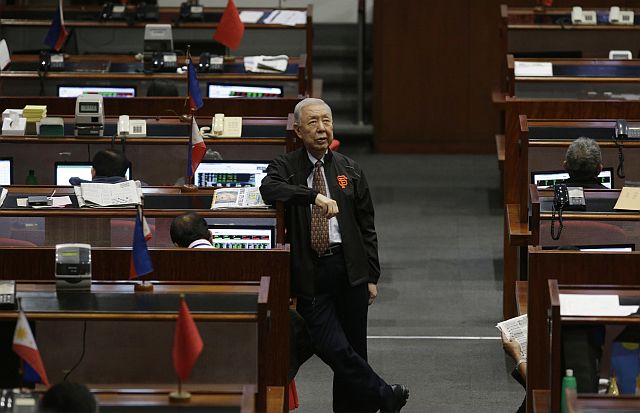
A trader takes time out during a lull in the trading day at the Philippine Stock Exchange in Manila (AP PHOTO).
The local stock barometer has wiped out all gains earlier seen in the year, sliding to the 6,800 level as US policy risk arising from Donald Trump’s election as the new president escalated aversion to most emerging markets.
The Philippine Stock Exchange index (PSEi) shed 103.61 points or 1.49 percent to close at 6,871.48 on Monday as foreign investors trimmed exposure to emerging markets.
The PSEi has now fallen below the 6,952.08 end-2015 closing level. It has likewise slid by 15.3 percent from the stock barometer’s peak level of 8,118.44 seen last July.
Peso drops
The peso also dropped on Monday to P49.20 against the US dollar, the peso’s weakest since Dec. 4, 2008’s 49.37:$1. The peso dropped to the near eight-year low level, a level of weakness previously experienced at the height of the global financial crisis in 2008.
At the Philippine Dealing System, the domestic currency reached an intraday low of 49.2:$1 and a high of 49:$1 after opening at 49.01:$1.
The total volume traded slid to $661.85 million from $707.5 million last Friday.
Bangko Sentral ng Pilipinas Governor Amando M. Tetangco Jr. told reporters that the weaker peso was a result of the dollar’s strength.
“The other regional currencies also showed weakness today because the expectation of the market is the policies that are going to be adopted by the US government [under Donald Trump] will likely lead to higher interest rates, particularly Treasury rates, and as a result of that, capital flows are being moved towards the US. That’s regional, emerging markets-wide,” Tetangco explained.
Heavy sellers
At the Philippine Stock Exchange, foreign investors were heavy sellers in the local stock market, resulting in net outflows of P1.69 billion for the day.
“Clearly we know little about actual Trump administration policies which will be pursued – this in itself will create uncertainty. From the election campaign, one can surmise that Mr. Trump is not exactly trade-friendly and would like to renegotiate certain security agreements. Increased tariffs toward goods made in EM (emerging markets) would have an impact on liquidity and profits within EM. Neither of these two outcomes are a positive for EM,” Citigroup said in a research note on Monday.
“Until the market has greater clarity, the risk premium for risk assets will remain high. This will hurt EM,” it said.
On Monday, India underperformed other Asian markets as its main index slid by 2.69 percent. The main stock barometers in Indonesia, Hong Kong and Thailand were likewise all down by over 1 percent while stock indices in Malaysia, Singapore, Korea and Taiwan also slipped. On the other hand, China’s main stock barometer rose by 0.45 percent.
“I expect volatility to continue as markets try to decipher potential policies from Trump. Having said that, there is downside risk to the market from foreign funds outflow as investors price in a Federal Reserve rate hike in December and a more aggressive fiscal expansion in the US,” said BPI Securities president Michaelangelo Oyson.
“So far, the results season has provided additional reason to be more excited by the market. While I don’t think the BPO (business process outsourcing ) sector is in the line of fire of Trump’s policies of bringing back jobs back to the US, investors may continue to price in such risk as we have seen in the recent share price movements of ALI, RLC and Megaworld,” he said.
Near buy territory
But as the market continued to correct, Oyson said the stock market was close to entering “buy” territory.
At the local stock market, likewise contributing to the PSEi’s decline apart from US policy risk was the sell-off on telecom stocks, with PLDT sliding by 4.2 percent.

